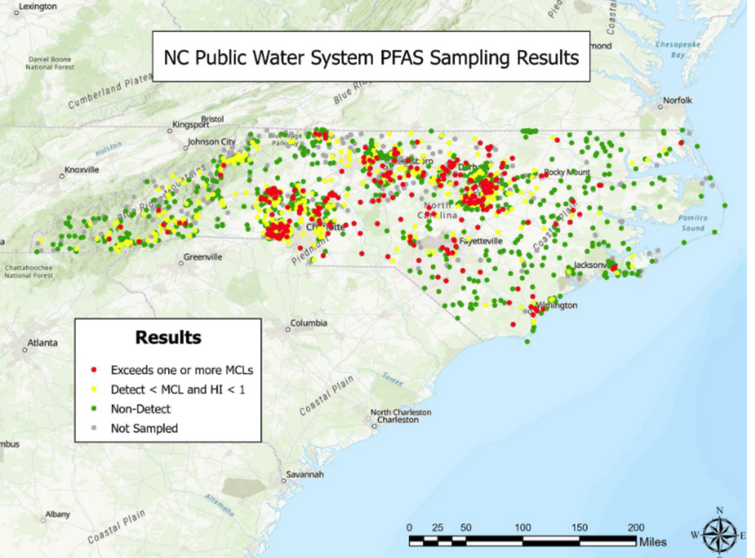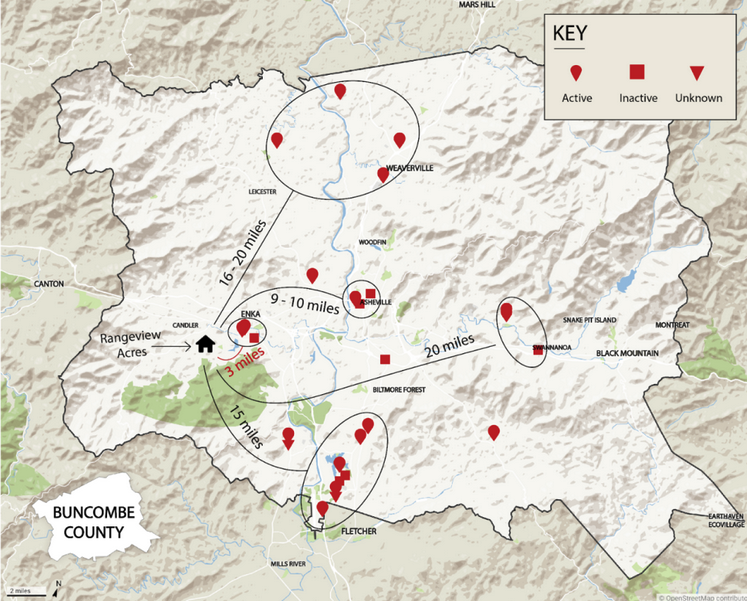Residents of five mobile home parks in Buncombe and Henderson counties rely on water systems that exceed the limit of PFAS compounds, known as forever chemicals, putting them at greater risk of cancer and other illnesses.
Two of the parks had nearly double the limit of the compounds allowed in drinking water – 4 parts per trillion (ppt) – set for the first time in April by the U.S. Environmental Protection Agency, according to water tests conducted between August and October 2023 by state environmental regulators.
State inspectors found 7.27 ppt of PFOA (Perfluorooctanoic acid), one of the compounds of PFAS, at Rangeview Acres in Candler and 8.85 ppt at Jeter Mountain in Hendersonville. Magnolia, Maple Hills, and Oak Crest mobile home parks in Hendersonville had 4.31, 4.99, and 4.71 ppt of PFOA in their water systems, respectively. All of the parks use well water.
All five parks are located within 2-20 miles of at least 40 active or inactive manufacturing companies and landfills, according to an analysis of EPA data by Asheville Watchdog. It isn’t clear if the companies use or have used PFAS.
At least 275 residents are drinking water that contains PFAS compounds that exceed the limit set by the EPA.

More than 300 municipal, county, and small water systems in North Carolina contain PFAS that exceed the new standards, according to the North Carolina Department of Environmental Quality. Forty two of the municipal systems serve nearly 3 million residents combined, according to the NCDEQ.
None of the mobile home park residents interviewed by The Watchdog said they were aware of the presence of PFAS in their water.
Hailey Garven expressed surprise and dismay when she learned there were forever chemicals in the water at her mobile park home in Jeter Mountain.
“I’m concerned we were not informed. I’m openly concerned about that. I feel like if that’s not a requirement, it should be, because that is a matter of public health,” she said. “We do have the right to be informed so that we can make educated [decisions].”

In the four years she’s lived in Jeter Mountain, Garven said, she’s been diagnosed with Hashimoto’s disease, an autoimmune illness that affects the thyroid gland and runs in her family. She was additionally diagnosed with lupus, which she has no family history of. She said she isn’t associating her lupus diagnosis to PFAS, but it “tickled my brain.”
The Watchdog reached out multiple times to owners of all five mobile home parks. Owners for Jeter Mountain, Magnolia, and Maple Hills did not respond by deadline. Owners of the Rangeview park declined to comment.

Dennis Lanning, manager of the Oak Crest mobile home park, said he did not know state inspectors tested for PFAS in the water system. He said the property has a third-party company that “takes care of all of the testing and anything that has to be adjusted in the water,” and reports the test results to the state. The state then sends that report back to him, which he has “passed out personally,” he said.
He said he reviewed the most recent third-party report from January 2023 and said he couldn’t find anything about PFAS in it. The NCDEQ tested the water in October 2023.
PFAS (per- and polyfluoroalkyl substances) are man-made chemicals used in nonstick cookware, foam in fire extinguishers, pizza boxes, and stain-resistant fabrics. The chemicals are nearly indestructible and accumulate in the environment and human body. They are linked to risks of certain cancers, reproductive issues, birth defects, weaker immune systems, and thyroid and hormonal issues.
‘These are pretty serious health concerns’
“These are pretty serious health concerns,” said Dr. Virgina Guidry, head of occupational and environmental epidemiology at the North Carolina Department of Health and Human Services.
“We really want to make sure that people are aware and can reduce their PFAS exposures as much as possible,” she said.
NCDEQ tested water systems across the state, including the Buncombe and Henderson mobile home parks, between 2022 and 2023 and notified property owners of their contamination levels, recommending they tell residents and customers.
Josh Kastrinsky, a spokesperson for NCDEQ said “small systems that were sampled received mailed letters this spring outlining next steps on testing and resources for funding specifically for small systems.”
“DEQ has recommended using these results to consider what steps may be necessary to address PFAS contamination in the future,” he said.
Sources of the PFAS in the Buncombe and Henderson mobile home parks could have been identified if NCDEQ had been enforcing its power to make companies test their water and let officials and the public know whether they use the chemicals, said a senior attorney with the Southern Environmental Law Center.
“North Carolina has not done enough to require other industrial facilities throughout the state to do that,” said attorney Jean Zhuang. “[NC]DEQ isn’t requiring enforcement of the law in the way they need to, so that these sources actually are identified.”
The state sends questionnaires to companies, Zhuang said, asking if they’ve sampled for PFAS and to submit the results. However, the sampling is voluntary.
NCDEQ intends to additionally propose standards that would reduce PFAS in drinking water supplies, surface water, and groundwater.
The state standards would work alongside federal drinking water standards and “ensure that residents of North Carolina are not bearing the entire cost for addressing PFAS,” Kastrinsky said.
NCDEQ has presented those standards to the Environmental Management Commission (EMC), a 15-member body appointed by the governor and tasked with enacting rules for NCDEQ, to begin the rulemaking process and adopt them.
But the Environmental Management Commission (EMC) is stalling in setting groundwater standards for PFAS, Zhuang said.
Charlie Carter, a member of the EMC, said via email that the NCDEQ had failed to provide the group “with the necessary information and regulatory documents required for EMC to conduct rulemaking for PFAS.”
“They have dragged out PFAS rulemaking for many months by failing to meet the regulatory requirements of the North Carolina Administrative Procedure Act. Until they do so, EMC cannot proceed,” Carter said.
The NCDEQ has been developing proposed standards for surface water discharges and groundwater cleanup standards under North Carolina Administration Code for the last two years, Kastrinksy said. He referred The Watchdog to a timeline the NCDEQ published, which showed that the agency had presented the EMC with proposed standards since May 2022.
“[NC]DEQ has provided several updates and presentations to the EMC as noted in that timeline and has prepared the rule packages for the Committees to consider during the EMC’s July [2024] meeting,” he said.
Some EMC members have said they need more time in understanding the costs, technologies, and treatments that would be involved.
“There may be things in North Carolina … that would impact the cost and the technologies and treatments or even the impacts in the state,” said Chair Commissioner J.D. Solomon, according to a recording of the EMC’s May 9 meeting. “That’s got to be documented to the public before the rule could get passed.”
Gary J. Salamido, CEO of the North Carolina Chamber of Commerce expressed similar concerns in an April letter to NCDEQ Secretary Elizabeth Biser, urging the NCDEQ to “delay any action until we receive appropriate studies and have greater clarity on the benefits and cost of regulation.”
Secretary Biser responded to Salamido and Solomon before the May 9 meeting to “dispel misinformation” and express her disappointment in the EMC’s Groundwater and Waste Management Committee for delaying to vote on the rulemaking.
While the commission’s delay “is absolutely unacceptable… [NCDEQ] should use their existing authority to control industrial sources in the meantime because the EPA has also said states have existing authority to control these sources,” Zhuang said.
Kastrinsky said the NCDEQ “is working on source reduction and proposed standards to reduce the amount of PFAS entering the environment and reduce the costs of treatment as water systems work to comply with the new federal drinking water standards.”
Widespread exposure to PFAS
PFAS chemicals were developed in the late 1930s and became widely used in manufacturing because of their resistance to water and grease. Today there are more than 15,000 such compounds, and according to a report from the U.S. Centers for Disease Control and Prevention, 97% of Americans have traces of the chemicals in their blood.
Awareness of the chemicals and their danger has grown over the years. In April, as part of the federal Superfund law, the EPA designated two widely used types of PFAS – PFOA (perfluorooctanoic acid) and PFOS (perfluorooctanesulfonic acid) – as hazardous and required companies to clean up areas they’ve contaminated with the chemicals.
Chemical manufacturer Chemours, a spinoff of DuPont located in Fayetteville, N.C., is one of those companies. Chemours and DuPont have discharged the PFAS compound GenX into the Cape Fear River for more than 40 years, according to a class-action lawsuit filed on behalf of hundreds of thousands of residents living near the river, which is their main source of drinking water.
The state has fined Chemours and DuPont multiple times over the years and North Carolina Attorney General Josh Stein sued them and other related companies in 2020. In February, a United Nations panel said Chemours and DuPont have been “disregarding the rights and wellbeing of residents.”
Gov. Roy Cooper proclaimed June3-7 as PFAS Awareness Week in North Carolina.
“North Carolinians deserve clean water and we must be at the forefront of the fight to contain forever chemicals,” said Cooper. “We are holding polluters accountable, researching solutions, and working hard to protect people’s health.”
Because PFAS is so widespread and has been around for decades, it is “difficult to determine the original sources of existing contamination,” the NCDEQ’s Kastrinksy said.
Water with PFAS levels above the EPA limit should undergo filtration to reduce the chemicals, state and federal government officials say. The water systems will have five years to meet the 4 ppt limit.
“Whenever we see a level and drinking water that exceeds those values, we would recommend treatment for that drinking water to bring the value down,” said Guidry.

Mixed reactions from residents
Jeanette Hutchinson, a Rangeview Acres resident for more than 30 years, said she hasn’t had any issues with the water there.
“The cold is cold, and the hot is hot – it’s good running water,” Hutchinson said.
She said the mobile home park owner sends out a report about the water each year and it shows that “it’s been tested and everything is OK.”
Steve Wilkinson, another resident of the mobile home park, said he also receives a report, and hasn’t had any issues with the water or anything else in the park.
“It doesn’t bother me at all,” Wilkinson said when asked about the mobile home park’s water test results from the NCDEQ and PFAS chemicals. “There’s 91 trailers in here, and no one here has gotten sick yet.”
Wilkinson retired after working with the Air Force and with the Firestone Corp. near Atlanta. He said most of the people in the park are retired.
Ronny and Janney Lively, five-year residents of the Jeter Mountain mobile home park, said they were aware of PFAS in general – they filter their water and switched from using non-stick pans to cast-iron because of their concerns – but they weren’t aware of the chemicals being present in their water.
Unlike her husband, who said he’s not too worried about the finding, Janney Lively, who is going through menopause, said she’s concerned because of PFAS’ hormonal effects.
As for Hailey Garven, the Jeter Mountain water has always been “too chlorinated for me,” and she buys bottled water because of that.
“I’ve lived here for a little over four years now,” she said. “And I’ve always drank bottled water.”
Tony Lewis, her former husband, said the water was never a problem for him, but he knew she was sensitive to it. After learning of Jeter Mountain’s PFAS contamination levels, they agreed that their children will not drink the water anymore.
“If we can take steps now, measures now, then we may have a chance of limiting further damage to maybe future generations,” Garven said.
Asheville Watchdog reporter and columnist John Boyle contributed to this report.
Asheville Watchdog is a nonprofit news team producing stories that matter to Asheville and Buncombe County. Victoria A. Ifatusin joined us through a 12-month fellowship as part of the prestigious Scripps Howard Fund’s Roy W. Howard Fellowship program. You can reach her via email at vifatusin@avlwatchdog.org. The Watchdog’s reporting is made possible by donations from the community. To show your support for this vital public service please visit avlwatchdog.org/donate.




Hey Asheville! Hey Esther! Does anyone care????